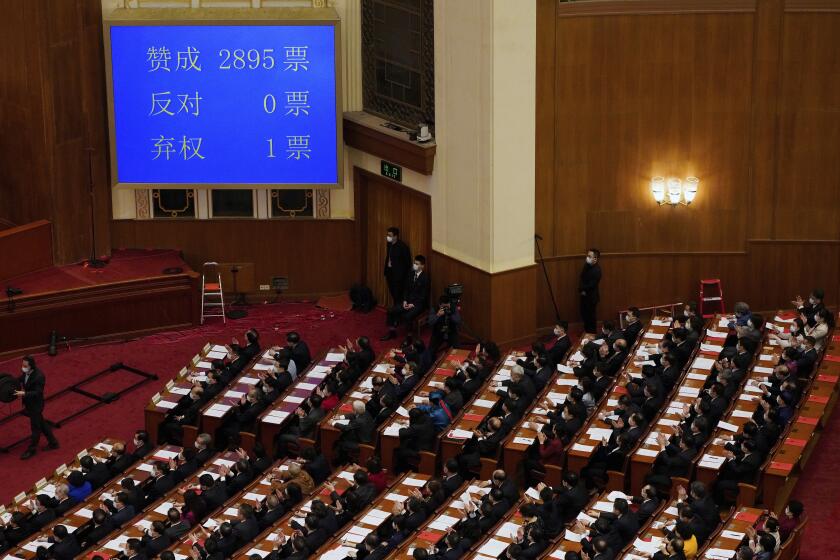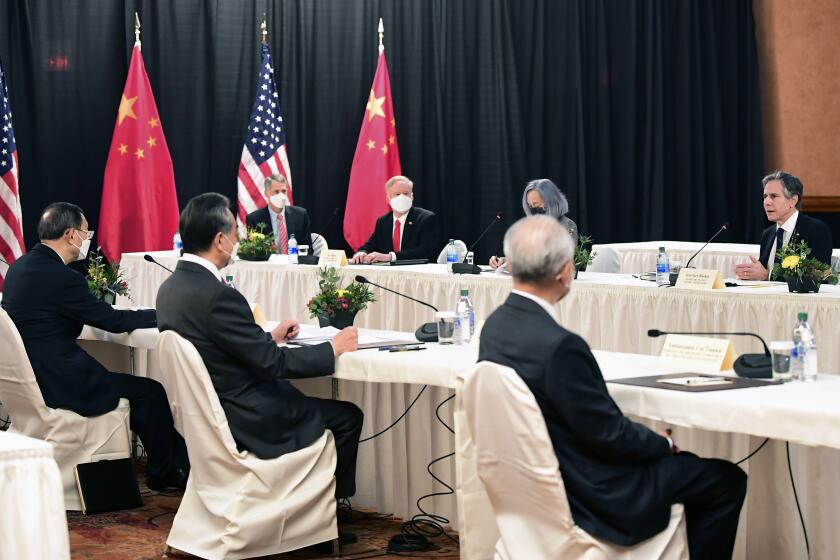Beijing denounces U.S. competitiveness bill as treating China as ‘imaginary enemy’

- Share via
BEIJING — Beijing on Wednesday denounced a U.S. bill aimed at boosting U.S. technology in the face of growing competition from China and others, calling it a thinly veiled attack on China’s domestic politics and an attempt to constrain its development.
The Foreign Affairs Committee of China’s ceremonial legislature, the National People’s Congress, issued a scathing statement expressing its “strong dissatisfaction and resolute opposition” to the U.S. Innovation and Competition Act, which passed with overwhelming bipartisan support in the Senate on Tuesday.
“This bill seeks to exaggerate and spread the so-called ‘China threat’ to maintain global American hegemony, using human rights and religion as excuses to interfere in China’s domestic politics, and deprive China of its legitimate development rights,” the statement said.
“No force should expect that China will swallow any bitter fruit that harms China’s sovereignty, security or development interests,” it said, echoing language used by President Xi Jinping, who has adopted an aggressive foreign policy that responds harshly to any perceived attacks on China’s reputation.
The statement also attacked provisions of the bill expressing support for Taiwan, the self-governing island democracy that China claims as its own territory; references to Hong Kong, where Beijing is accused of rolling back democracy; and criticism of Chinese policy in its northwestern territory of Xinjiang, the site of mass detentions of minority Muslim groups.
Those and related issues are “purely China’s internal affairs, and absolutely no foreign interference will be tolerated,” the statement said.
China approves plans to exert more power over Hong Kong, compete with the U.S. in technology and bolster Mandarin-language education.
At a daily briefing, Foreign Ministry spokesperson Wang Wenbin said China-related content in the bill was “full of Cold War zero-sum thinking“ which “distorts the facts [and] smears China’s development path and domestic and foreign policies.”
“It is a matter for the U.S. itself as to how to develop and enhance its competitiveness. But we firmly oppose the U.S. making an issue of China and treating China as an imaginary enemy,” Wang said.
The 68-32 vote for the bill demonstrated how confronting China economically is an issue that unites both parties in Congress at a time of intense partisan division.
Senators have sought to call attention to China’s growing influence without stoking divisive anti-Asian rhetoric when hate crimes against Asian Americans have spiked during the COVID-19 pandemic.
U.S. and Chinese officials got off to a rocky start in their first face-to-face meeting since Biden took office.
The centerpiece of the bill is a $50-billion emergency allotment to the Commerce Department to support semiconductor development and manufacturing through research and incentive programs previously authorized by Congress. The bill’s overall cost would increase spending by about $250 billion, with most of the spending occurring in the first five years.
Other measures in the bill spell out national security concerns and target money-laundering schemes or cyberattacks by entities on behalf of the Chinese government. There are also “buy America” provisions for infrastructure projects in the U.S.
Senators added provisions that reflect shifting attitudes toward China’s handling of the coronavirus outbreak. One would prevent federal money for the Wuhan Institute of Virology as new investigations proceed into the origins of the virus and possible connections to the lab’s research. Cases of the coronavirus were first recorded in the central Chinese city of Wuhan, but China has rejected any relationship between the outbreak and the institute.
It’s unclear whether the measure will find support in the Democratic-led House, where the Science Committee is expected soon to consider that chamber’s version.
More to Read
Sign up for Essential California
The most important California stories and recommendations in your inbox every morning.
You may occasionally receive promotional content from the Los Angeles Times.












